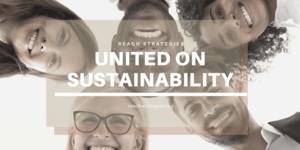Sustainability touches everyone. Regardless of race, gender, economic class, political party, or sexual orientation, the health of the earth impacts us all. Sustainability is an important topic that brings people together in more places than just the voting booth. Community cleanup events, recycling campaigns, Earth Day celebrations, and even farmers’ markets demonstrate how people want to come together around this purpose. We see the same play out in the business world, too.
 Through our work, we’ve discovered that different branches that may rarely interact, when given the opportunity to come together around sustainability, will embrace the opportunity with enthusiasm. At least that’s been our experience so far across a range of partners including municipalities, Fortune 500 companies, utilities, nonprofits, foundations, and states.
Through our work, we’ve discovered that different branches that may rarely interact, when given the opportunity to come together around sustainability, will embrace the opportunity with enthusiasm. At least that’s been our experience so far across a range of partners including municipalities, Fortune 500 companies, utilities, nonprofits, foundations, and states.
United by a Common Goal
Employees in different departments often feel siloed, focusing only on executing their own portion of the work to be done. When a company makes the decision to set goals on social issues such as sustainability, it provides an opportunity for different segments of a business to interact in order to achieve the goals that have been set. It also gives employees an opportunity to connect with each other in new ways. At our workplace sustainability fairs, we routinely hear feedback about how great it is to have a chance to learn about what other teams and departments are doing.
In order to make sustainability goals a priority across the board, companies have brought diverse groups together to ensure that they understand their role in achieving the goal and how their actions can make a difference. Integrating teams in this way often require opening the channels of communication between different departments to put plans into action. For example, if a company has a goal of reducing carbon emissions by incentivizing carpooling among commuters, employee engagement programs can help organize participants by particular geographies to participate. Promoting electrified transportation options such as electric shuttles is another example.
Sustainability Events Bring Teams Together
 In addition to company-wide goals, events can also become a bridge for employees in different departments. At REACH Strategies, we’ve seen the power of direct experience in introducing people to sustainability topics and choices, be it an individual level or for a whole corporate division. Through organizing sustainability events at corporate campuses across the country — including sustainable lifestyle fairs, coast and park cleanups, and electric vehicle test drives, among others — we’ve learned that successful events include the cooperation of many different departments across an enterprise.
In addition to company-wide goals, events can also become a bridge for employees in different departments. At REACH Strategies, we’ve seen the power of direct experience in introducing people to sustainability topics and choices, be it an individual level or for a whole corporate division. Through organizing sustainability events at corporate campuses across the country — including sustainable lifestyle fairs, coast and park cleanups, and electric vehicle test drives, among others — we’ve learned that successful events include the cooperation of many different departments across an enterprise.
For in-person events, facilities departments provide suggestions for where to set up registration and any vendor booths and tables. Marketing and human resources can help promote the event to employees. Maintenance is on hand for any setup needs that may arise. Even in the virtual world, we’re seeing how important it is to have departments in sync with each other. Allowing different departments the opportunity to present their work to their peers at events can inspire employees to keep sustainability a focus both at work and home.
As strategists, it’s always exciting to watch the different ways our partners interact with and approach sustainability and engagement strategies that work best for them.
Do you have a story about how your business came together on sustainability? Share it with us on Twitter @ReachStrategies.
Additional Reading:
Sustainability Incorporate: Integrating Sustainability into Business



